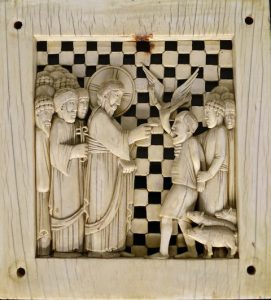HOMILY WEEKDAY 01 02 – Year I
Jesus: True God and True Man
(Heb 2:5-12; Ps 8; Mk 1:21-28)
*****************************************
Our Christian faith invites us to worship Jesus as divine, and relate to his humanity as a brother.
The author of Hebrews in yesterday’s first reading seemed very intent on establishing the identity of Jesus, utilizing such expressions as “Son of God, heir of all things, exact reflection of the Father’s glory and imprint of God’s very being, creator of the whole universe and superior to the angels.”
The same author, in today’s first reading, seems intent on just the opposite – establishing the humanity of Jesus, who was “made lower than the angels, suffered death, was the pioneer of salvation made perfect through suffering,” and who is “not ashamed to call us his brothers and sisters.”
Travelling through the rugged beauty of the mountains and canyons of Utah and Arizona on my holiday trip south one year became almost a pilgrimage, as in the morning I would do a travelling “holy hour” marveling in awe at all this natural beauty created by Jesus “through whom all things were made.” It was not hard to see the divinity of Jesus is such beauty.
What helped me appreciate the humanity of Jesus was our recent pilgrimage to the Holy Land, visiting the sites where Jesus walked, lived, suffered and died to show us the depth of the Father’s love for us. To think that Jesus walked on this earth, in his humanity, solidified my appreciation of that humanity.
In the gospel, we see both dimensions of this mystery of the Incarnation in play. The townspeople were amazed that Jesus, one of theirs, who lived among them, who was so human and so ordinary, could do such wonders as heal a man with an unclean spirit.
In this gospel, Mark is very much like the author of Hebrews yesterday, intent on proving the divinity of Jesus. Jesus first of all astounded the people by teaching with authority, unlike the scribes. The mode of teaching used by the rabbis and scribes was to make a point and substantiate that point by quoting other well-known sources. I have done my share of that myself, having spent time and effort trying to track down references for all the quotes I used in my latest book Still Green and Growing published by Novalis. Well, Jesus did none of that – he never quoted any other source because he was the source of all truth and wisdom – he simply spoke from his own inner authority in a way no other human being had done before.
Actually, I have a little glimpse into what that is like, because my other book Drumming From Within, is all about my experience of ministering among the Indigenous peoples in the north, so I could just share my experience and had no need to quote anyone in that book. I guess I was able to write with a certain authority that could be seen as a pale reflection of the authority with which Jesus spoke and taught.

Jesus heals a demoniac
Jesus then healed the man troubled by demons, who identifies Jesus as the Holy One of God, thus reinforcing his claim to divinity. Jesus rebuked the evil spirits, and they obeyed, coming out of the man, showing his divine power over evil. So, between the first reading and the gospel, we see Jesus for who he is, true God and true man.
The psalm, borrowing a line from the gospel and an idea from the first reading, invites us to worship Jesus with the response, “You gave your Son authority over all creation.”
Every Eucharist has two tables – that of the Word, and that of the Eucharist itself. Certainly, the table of the word today balances both the divinity and humanity of Jesus, and invites us to worship him as God. May our celebration strengthen our faith in Jesus as fully divine, and deepen our relationship with him as our brother.



